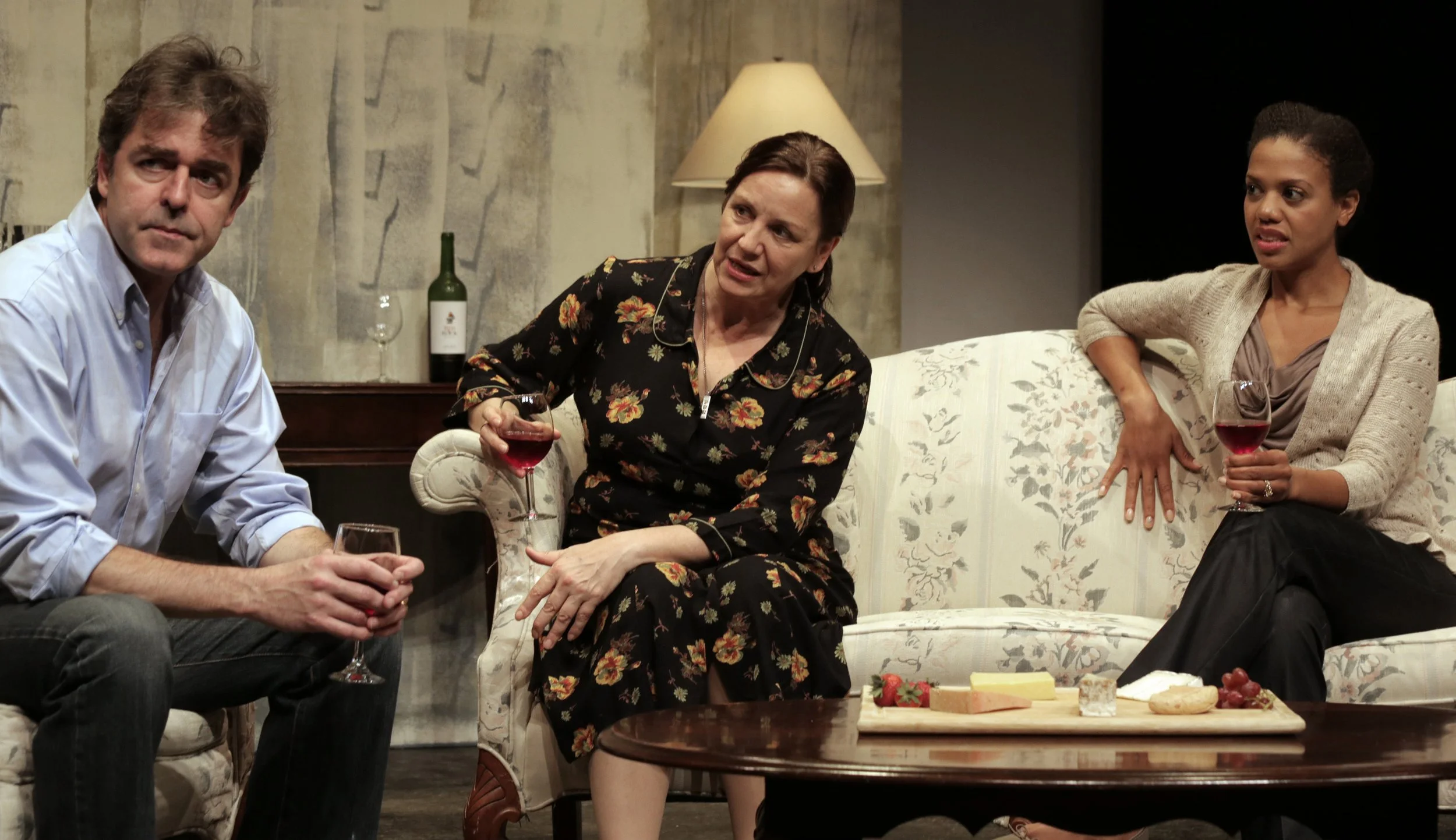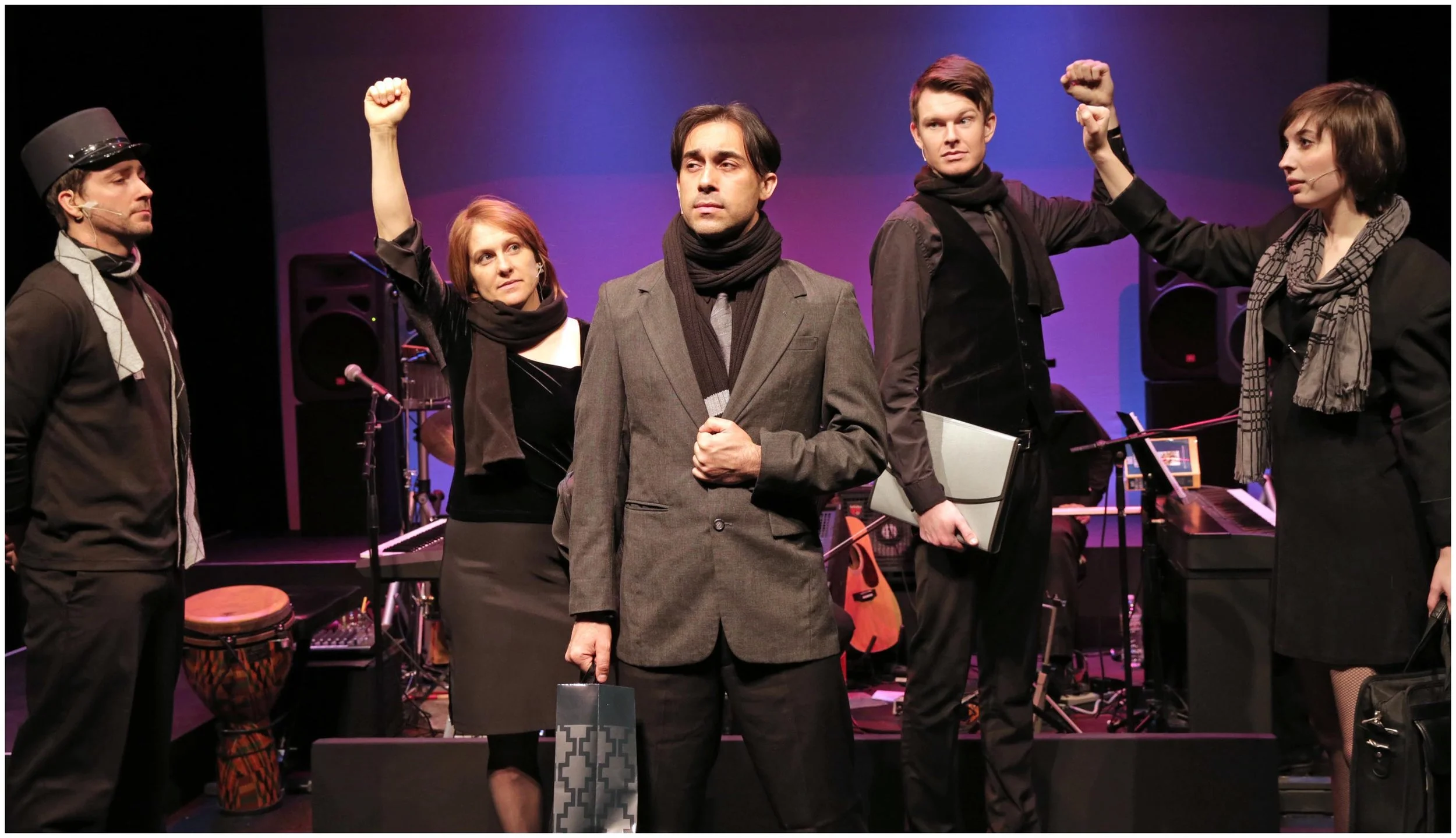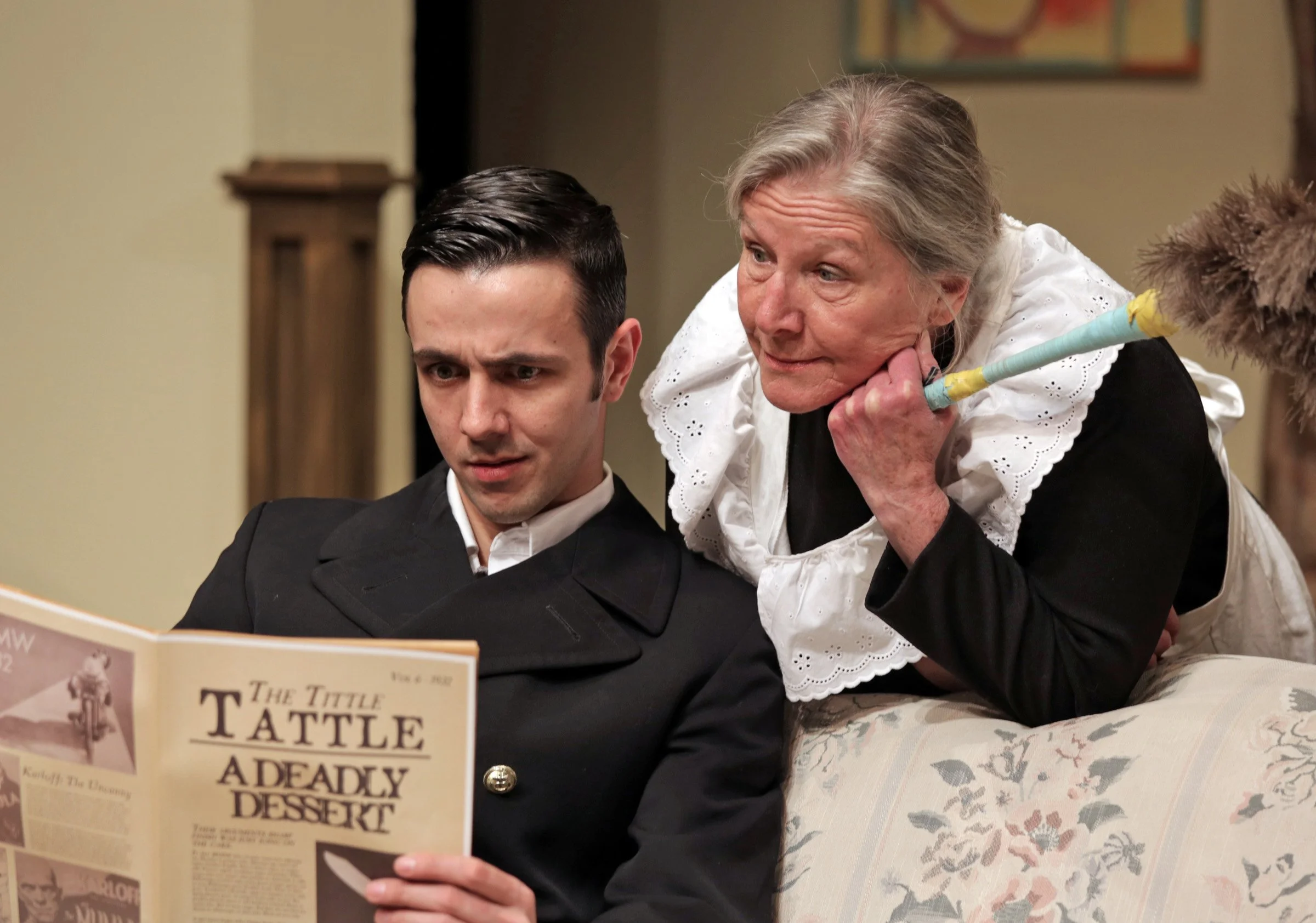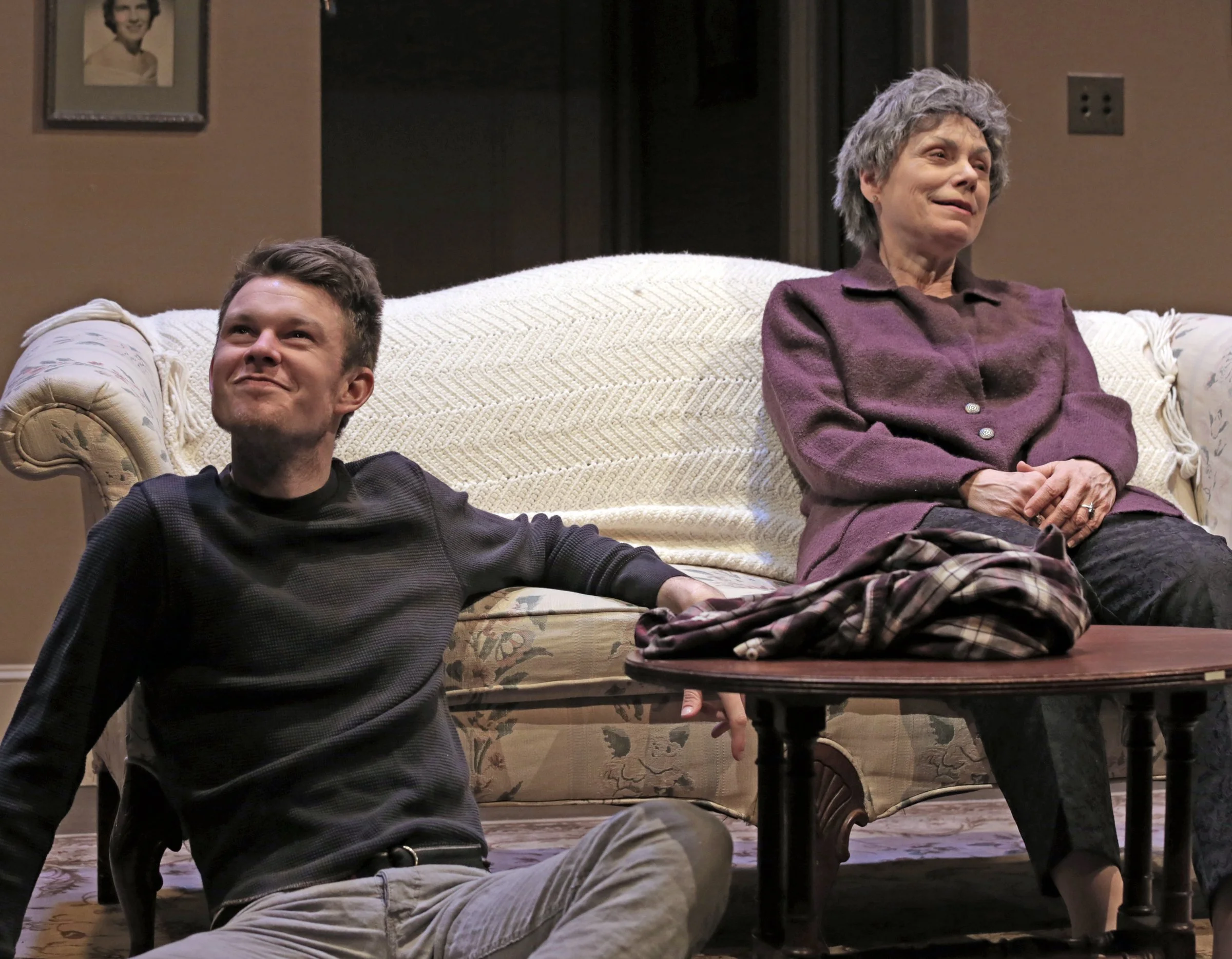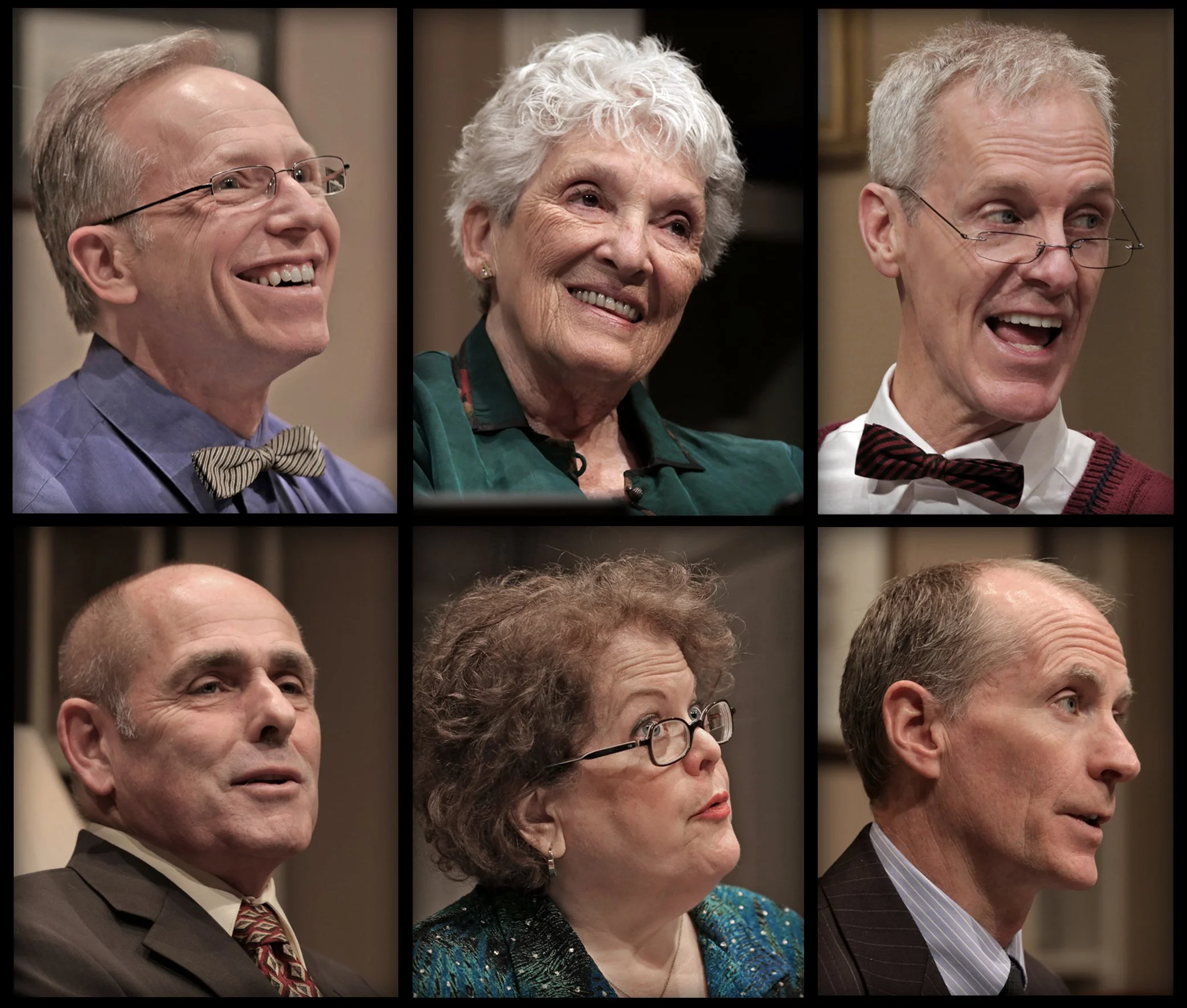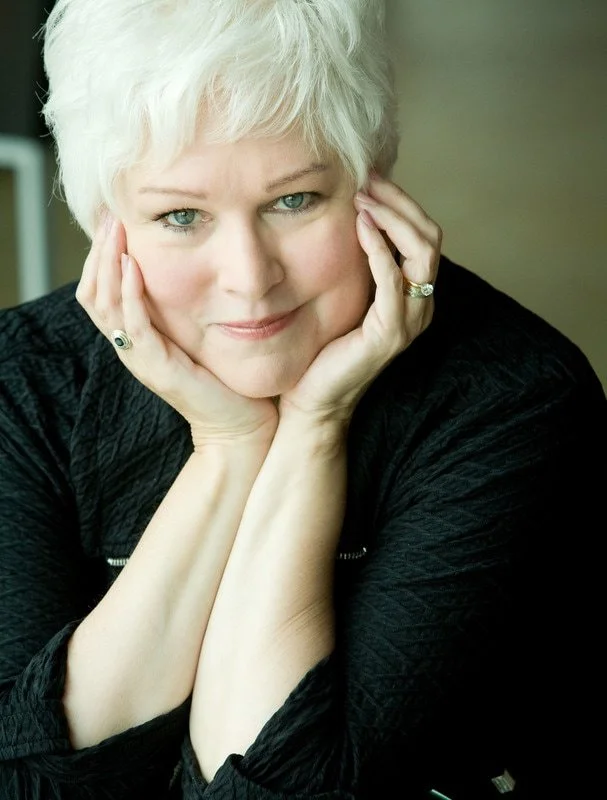Season 11
2012 - 2013
Good People
by A.R. Gurney
October 10 - November 4, 2012
Maine Premiere
A woman from South Boston who didn't get out meets an old boyfriend, now a doctor, who got out and has moved back "home."
With humor, Lindsay-Abaire explores the struggles, shifting loyalties and unshakeable hopes that come with having next to nothing in America. Set in Boston’s Southie neighborhood, where a night on the town means a few rounds of bingo, where this month’s paycheck covers last month’s bills, we meet Margaret, who is facing eviction and scrambling to catch a break. When a friend from the old neighborhood, who is now very successful, moves back to town, Margaret hopes he may be the ticket to turning her life around.
-
Margaret – Denise Poirier*
Stevie – Jesse Leighton
Dottie – Suzanne Rankin
Jean – Amy Roche
Mike – James Hoban*
Kate – Noelle LuSaneDirected by Brian P. Allen^
* Member Actors' Equity Association
^ Member SDC, Society of Directors & Choreographers -
GOOD CAST, GOOD QUESTIONS MAKE ‘GOOD PEOPLE’ EXCELLENT THEATER
Maine Sunday Telegram, by April Boyle 10/14/2012In these hard economic times, many Americans may wonder how the choices they have made have shaped their lives. Is it all about the paths we choose? Or, are some people just born luckier than others?
The Good Theater is giving voice to these questions and more with the Maine premiere of David Lindsay-Abaire's "Good People."
The play provides an intimate glimpse into the life of Margie Walsh (Denise Poirier), a middle-aged, single mother of an adult mentally challenged daughter. The South Boston native is barely making ends meet working as a dollar-store clerk for just slightly more than $9 an hour. Her boss, Stevie (Jesse Leighton), is the son of a former classmate.
As the play opens, Margie is fired for repeatedly showing up late for work due to child care issues.
It's a story that is all too familiar in this day and age. And one that clearly held appeal for patrons at the packed Good Theater Friday night.
Laughter mingled with emotion as Margie's life unfolded on stage. The Good Theater has assembled a dynamic cast led by Poirier as the spunky Southie who never gives up, no matter what hardships life throws her way.
As a part-time actress living in New York, the 50-year-old Maine native knows what it's like to fight for her dreams. Poirier delved into this resilience Friday, bringing realism and depth to the role. She further captured the character with a full-blown Southie accent and attitude, imbued with an impeccable comic timing that cracked up both the audience and cast.
Suzanne Rankin and Amy Roche added sass and pluck as Margie's landlady, Dottie, and best friend, Jean. The pair played off each other like Abbott and Costello, providing flavorful cultural context to Margie's life.
The disparate differences between the haves and the have-nots is one of many ongoing themes explored in "Good People." James Noel Hoban (Mike) and Noelle LuSane (Kate) lent passionate performances Friday that flushed out this dichotomy, all the while posing more questions.
Mike, Margie's ex-boyfriend, escaped South Boston to become a doctor living in Chestnut Hill, a wealthy suburb of Boston. He lives a "lace curtain" life with his socialite wife, Kate, and their young daughter. But is his life really better? Is he one of the "good people"?
Leighton rounded out the well-chosen cast as Margie's misunderstood, maligned young boss. He nailed the role, with an underlying compassion and humility.
We are all shaped by the choices we make and the opportunities afforded us. But, in the end, it's not always easy to tell who the "good people" really are, or to define what constitutes a good life.
"Good People" offers a relevant and thought-provoking portrayal of life that the average person can identify with on some level. We've all made good and bad choices, but how we handle those choices ultimately defines our true character.
‘GOOD PEOPLE’ OPENS SEASON AT GOOD THEATER
The Forecaster, by Scott Andrews, 10/15/2012Engineers tell us that the triangle is the most stable geometric form, employing terms such as “invariant under stress.” But writers and dramatists have long known that the romantic triangle is one of life’s most unstable forms, prone to messy collapse under stress.
The tensions caused by an unusual romantic triangle in extremely stressful economic and social circumstances is the driving dynamic behind David Lindsay-Abaire’s latest drama, “Good People.” Portland’s Good Theater, the city’s top-notch professional company, has mounted a fine production of this excellent script as the opening show in its 11th season.
The two contrasting settings reflect the social and economic tension: the gritty neighborhood of South Boston and posh suburban Chestnut Hill. The principal character is a single mom who has lived in Southie all her life, while her former high school lover has become a very successful doctor who now lives in a big house in the wealthy suburb. After a hiatus of nearly two decades, the two confront each other. Plus there’s a major complication: the doctor’s strained relationship with his elegant black wife, who hails from an equally posh background in Washington, D.C.
Emotional fireworks explode, ignited by fine performances by the three principals: Denise Poirier and James Noel Hoban, who both hail from southern Maine, and Noelle LuSane, a New York actress. Plus there’s excellent support from three others: Jesse Leighton, Suzanne Rankin and Amy Roche. Director Brian P. Allen, Good Theater’s co-founder and artistic director, helms this production admirably.
GOOD THEATER EXPLORES BEING STUCK, AND ESCAPING
The Portland Phoenix, by Megan Grumbling, 10/17/2012The wood walls are streaky and weathered in the homes of both Margie (Denise Poirier) and Mike (James Noel Hoban). But where Margie's walls are aging in a working-class apartment, in the same rough South Boston neighborhood where they were raised, Mike's are the result of trendily "distressed" interior design, in an affluent Boston suburb. The Good Theater lets the same walls stand for both settings, juxtaposing the reality and the romanticizing of poverty, in its smart and sympathetic production of the David Lindsay-Abaire's drama Good People. Under the sensitive direction of Brian P. Allen, the show brings Margie and Mike back together to explore the trials, mythology, and escape plans of life in the projects.
Thirty years after Margie and Mike and last saw each other in high school, she is a single mother of a severely developmentally disabled adult daughter, and recently fired from her job as a cashier at the dollar store. She's desperate enough to pay the rent that when her friend Jean (Amy Roche) mentions having run into Mike at a Boys and Girls Club benefit (Jean was with the caterers, while Mike, now a wealthy doctor, is on the board and a Southie success-story), Margie works up the gumption to call on him for help finding work. Their reunion is a fraught and sometimes unkind one, as each broaches what the other knows, believes, and tells of the histories that brought them to where they are in life.
As the tough-tongued, hard-luck Margie, the superb Poirier makes the woman's vulnerabilities clear from the beginning. Though her Margie cusses and manipulates, she also has a wary gentleness in her gaze. In her first moments visiting with Mike, we see at once her insecurity, her pride, and her eagerness. When she joshes him, it comes across as good-willed, and when she first really upsets him — in commenting that he's become "lace-curtain" — she seems to be more excited than vindictive. For his part, Mike seems to take a genuinely friendly interest in her, despite not having returned any of her calls; Hoban's Mike comes off as a mensch rather than an uppity asshole. That's crucial to the complexity of their dynamics when Margie later intrudes upon the home Mike shares with his professor wife Kate (Noelle LuSane).
Kate, the daughter of a Georgetown doctor, has always had money, and LuSane is perfectly cast — she's poised, sleek, lovely, and eminently likeable. She makes beautiful work of how Kate notices Margie's cultural differences from herself but also how a privileged liberal takes care to avoid acknowledging her awareness of them. She also convincingly portrays Kate's pendulum of belief and loyalty, as Margie's version of history increasingly challenges the one Mike has been telling his wife and himself. As the visit degenerates, Poirier and Hoban exude both rage and a ghost of an old rapport, even after unforgivable things have been said.
Still, in the end, Margie is back in Southie where she started. Allen's cast of Southie neighbors, including Roche, Jesse Leighton, and Suzanne Rankin, excel in their brash, bawdy banter; in moments when a key reveal breaks through the ribbing, the pacing might slow just an extra beat or two. All said, the Good Theater presents a poignant, challenging, and often wrenching portrait of a woman stuck in poverty and a man who escaped it. It does so at a time in America when questions of how these classes understand each other could hardly be more of the moment.
Striking 12
by: Brendan Milburn, Rachel Sheinkin and Valerie Vigoda
November 14 - December 9, 2012
Maine Premiere
A new holiday musical from the group Groove Lily and the book writer of The 25th Annual Putnam County Spelling Bee. Loosely based on Hans Christian Andersen's The Little Match Girl, STRIKING 12 is a fun, funny and upbeat holiday show featuring an incredible score and a dozen cast members/musicians.
Striking 12 is a perfect alternative to standard holiday fare while still being family-friendly. On New Year's Eve, an over-worked and under-inspired single guy who's had enough of holiday cheer makes a resolution: to stay home and go to bed early. On another New Year's Eve, a continent away—and more than a century earlier—Hans Christian Andersen's Little Match Girl tries unsuccessfully to sell her matches in the snow.
The two stories are brought together when a young woman selling special "full-spectrum holiday light bulbs" to combat Seasonal Affective Disorder shows up at the grumpy man's door. Though the man (who probably could use the bulbs) seems to enjoy the young woman's company, he sends her away. It's not until he reads The Little Match Girl that he is finally pulled out of his funk.
All of this unfolds through a tuneful pop/rock/jazz score that retains the vibrant style of its original performers: the celebrated band, GrooveLily. The witty and deeply moving script weaves three stories and settings: contemporary New York City, 19th century Denmark, and the very room in which the show is presented. Through simple, unpretentious theater created through the voices and instruments of the performers, Striking 12 reminds us that "the world looks like new... on the first day of the year."
-
Narrator 1 - Stephen Underwood
Narrator 2/Pianist – Vicky Stubbs
SAD Light Seller/Little Match Girl – Kelly Caufield
The Man Who’s Had Enough – Ryan Duncan*
Woman 2 – Marie Dittmer
Woman 3 – Samantha St. Onge
Happy Foley – Andrew Sawyer
Jack – Erik Moody
Violinist - Heather Kahill
Bass – John Lawson
Percussion 1 – Bill ManningDirected by Brian P. Allen^
Musical Director Victoria Stubbs* Member Actors' Equity Association
^ Member SDC, Society of Directors & Choreographers -
‘STRIKING 12’ LIFTS SPIRITS: GOOD THEATER GIVES US REASON TO KEEP THE HAPPY LIGHTS ON
Portland Press Herald, By Steve Feeney 11/15/2012Departing from its usual holiday concert of Broadway tunes, Good Theater this year has opened the festive season with the Maine premiere of a "hybrid concert/musical" called "Striking 12." With five instrumentalists at center stage throughout, the songs are still the main focus. But this show's imaginative storytelling ties it all together with a flowing ribbon of theatrical fun.
Loosely based on Hans Christian Andersen's "The Little Match Girl," writer/composers Brendan Milburn, Rachel Sheinkin and Valerie Vigoda updated and lightened the classic story by adding cheeky tunes, inside-joke comedy and certainly more earthly uplift than the 19th-century tale provided.
The Match Girl in this show is a seller of light bulbs designed to help those with Seasonal Affective Disorder, the affliction that can cause depression in folks during the diminished daylight of the winter months. There's a nice bit near the end of the show about why, in today's world, people can't just be plain old sad.
In any event, the story wraps up nicely with the Light Bulb Girl and her lonely customer finding that things can be "Wonderful."
Local stalwart Kelly Caufield takes the female lead and runs with it, selling not only light bulbs but several big numbers with a fine voice and effective stage presence. She flips with ease through the multiple levels of theatrical intensity called for from this overall light but still sophisticated show.
Broadway veteran Ryan Duncan plays the guy she wins over, after a trip back through the original Andersen text. An excellent voice and comic sense made Duncan a pleasure to see up close in the intimate St. Lawrence Theater space. Unlike some visitors to the provinces, he did not play above the material – and not only because the material was first-rate.
Erik Moody, Marie Dittmer, Samantha St. Onge and Andrew Sawyer round out the cast. Each has moments in the spotlight, with Moody particularly snazzy in the hilarious "Screwed-up People Make Great Art."
Heather Kahill was a solo standout on amplified violin at Thursday's show. She moved through a variety of genres, including rock, folk and jazz, adding textures and grit when not taking the lead.
Stephen Underwood and Victoria Stubbs provided vocal narration along with strong melody and counterpoint from their keyboards
This delightful show directed with a flowing and thoroughly engaging style by Brian P. Allen is a fun encouragement to keep your happy lights turned on during the upcoming holiday season.
‘STRIKING 12’... TOP CHOICE(S) THIS WEEK IN THE PERFORMING ARTS
The Forecaster, by Scott Andrews, 11/19/2012“Striking 12” is a clever and tuneful re-imagining of a classic tale by Hans Christian Andersen. “Striking 12” is more than totally out-of-the-box; it’s strikingly good.
“Does anybody need some light tonight?” is the poignant and plaintive refrain of Hans Christian Andersen’s classic tragic character, “The Little Match Girl.” Her cry also serves as the thematic undercurrent of “Striking 12,” the wonderful Off-Broadway musical by Good Theater that’s selling out Portland’s St. Lawrence Arts Center. It’s a Maine premiere that belongs on your must-do list.
“Striking 12” is a brilliant reworking of Andersen’s 19th-century tale, cleverly updated to 21st-century America and given a tuneful and contemporary musical twist by the creative team of Brendan Milburn, Rachel Sheinkin and Valerie Vigoda.
The team has worked all sorts of thespian gimmicks into “Striking 12.” Its basic conceit involves temporal legerdemain that crisscrosses centuries and continents and includes a play within a play and breaking the “fourth wall.” Gimmick-laden shows don’t usually impress me, but this one really works brilliantly.
The central character is The Man (Ryan Duncan), a 30-something bachelor business executive who has had his fill of false holiday cheer and vows to spend New Year’s Eve alone. Shortly after retiring to his apartment, he is visited by a 21st-century version of The Little Match Girl (Kelly Caufield). Soon the original character appears, wandering the streets of Copenhagen in the 1830s. The two tales intertwine through story, song and dance and the result is theatrical magic.
Six actors and five musicians – grouped in the center of the stage – combine forces for this fully professional production, helmed by Good Theater co-founder and artistic director, Brian P. Allen.
“Does anybody need some light tonight?” Good Theater’s production gives a resounding and brilliant “yes” to this question.
"wonderful…a tuneful and contemporary musical...a brilliant reworking of Andersen’s 19th-century tale…the result is theatrical magic…it's striking good."
NO HUMBUG HERE, BUT A GOOD HARRUMPH WILL DO!
The Portland Phoenix, By Megan Grumbling, 11/28/2012The singer Phoebe Snow has a great wry line about our next major secular holiday: "December 31st is the very worst time of the year. You have to find people that you like enough to share your beer." It's a sentiment that the protagonist of Striking 12, a morose young New Yorker referred to as The Man (Ryan Duncan), would agree with. As his friends and officemates plan parties for the big night, he plans to stay in and nurse a beer alone. That is, until a young woman (Kelly Caufield) knocks on his door selling strands of "full-spectrum holiday light bulbs." She spurs him to rediscover the Hans Christian Andersen story of "The Little Match Girl," and ultimately his holiday goodwill, in the Maine premiere of this yuletide theater alternative. Striking 12 is an upbeat, refreshingly low-frills musical ensemble show — a "holiday non-spectacular non-extravaganza" — under the direction of Brian P. Allen, for the Good Theater.
"Non-spectacular" means, among other things, no period petticoats or frock coats; all eleven performers wear sleek black- or gray-on-black, a good palette for both its primary setting, modern New York City, and its sub-setting, on the 19th-century Danish streets. Spatially, a sharp five-piece band (Stephen Underwood and Victoria Stubbs on keyboard, Bill Manning on percussion, John Lawson on bass and guitar, and Heather Kahill, beautifully, on violin) literally takes center stage. The actors (Erik Moody, Marie Dittmer, Samantha St. Onge, and Andrew Sawyer, all of whom are miked for singing), maneuver around them, interacting with them informally and in affectionately close quarters, and morphing nimbly between the voices in The Man's answering machine and TV, his co-workers, an ex, and the people one avoids at the more agonizing holiday parties.
As the New Year's dissident himself, Duncan (a guest artist from New York City) is sympathetic, blessedly subtle and self-deprecating in expressing his funk, and he has a pleasant conversational ease in his musical phrasing. As his light-offering catalyst (and her Danish counterpart), Caufield has her usual luminous candor and exquisite, clarion voice. She creates beautiful and evocative moments of simple actions, as when her lightbulb seller delightedly leans back against a pole to watch the snow fall, and she also pulls out the emotional stops as she takes her characters to heights of desperation.
The rest of the cast has a lot of fun with their various roles, often to really funny effect. Particularly notable are the bitchery of St. Onge's Diane, The Man's ex, phoning him to forbid his presence at a certain party; Dittmer's intolerable "Space Invading Girl" getting too close to him in his imagining of said party; and Moody's loud and douchey Jack, a friend of The Man's who has invited a calendar's worth of Brooklyn Babes with Biceps to his new year's party. The band members (billed as part of the cast) also get to put in their two cents, shout out to the actors, and even debate the merits of the show itself.
The script involves a lot of this meta-theatrical kind of thing: Caufield comes out of character to tell the audience about her research on Seasonal Affective Disorder; Sawyer leaves Caufield mid-scene to complain about his bit part; and the whole cast launches into a song about why "The Little Drummer Boy" might have been a better choice of story. That last bit is a little much, but in general, the self-reflexive banter is a fun and lively respite from the reverence of the usual holiday fare.
But Striking 12 is, of course, holiday fare, and its earnestness is in at least equal proportion to its humor. Unlike Scrooge, The Man's holiday ennui exists, in part, because he sees so much shallowness in the champagne-swigging first world. His embrace of the light despite that shallowness is the modern holiday miracle, and it's an embrace that many of us work hard to make, too.
Death by Design
by Rob Urbinati
January 30 - February 24, 2013
East Coast Premiere
What happens when you mix Noel Coward and a touch of Agatha Christie in an English country manor in 1932? A hilarious murder with multiple suspects! Fortunately, house maid Bridget is more than up to the task of finding out whodunit.
East Coast premiere of this new comedy starring Rob Cameron and Abigail Killeen (cast of eight) that pays tribute to both Noel Coward and Agatha Christie. A warring couple of London's theatre retreat to their country home for the weekend. Guests arrive and havoc reigns in this delightful new comedy with murder!
-
Direction - Brian P. Allen^
Lighting Design - Iain Odlin
Set Design/Assistant Tech Director - Craig Robinson
Scenic Artist - Brian Killeen
Costume Design/Stylist - Justine Cote
Production Stage Manager - Michael Lynch
Assistant Stage Manager - Heidi Therrien
Set Assistants - August DeLisle, Drew Christopher Joy, Scott Leland, Benjamin Row, Andrew Sawyer* Member Actors' Equity Association
^ Member SDC, Society of Directors & Choreographers -
WACKY ‘DEATH BY DESIGN’ KILLS IT
Maine Sunday Telegram, by April Boyle, 2/3/2013The play is called "Death by Design," but don't expect it to unlock the mystery to designing the perfect murder, unless the weapon of choice is laughter.
What playwright Rob Urbinati has designed is a recipe for fun that's perfect for livening up the dead of winter: Combine one part murder, two parts mayhem and season with a hearty dose of clever wit.
It's likely not a play you've ever heard of. Good Theater's production is the East Coast premiere of "Death by Design," and only the second time it has been staged.
The play comes to Good Theater following a world premiere in Houston in 2011. Audiences this time around are being treated to a new ending.
Urbinati was on hand for the final dress rehearsal and first two public performances at Good Theater, tweaking the play. Samuel French Inc. will soon publish the final version.
Think Noel Coward-meets-Agatha Christie, and you'll have some idea what to expect. Both served as inspiration for "Death by Design."
The result is a smart play, masquerading as an all-out farce.
"Death by Design" is so chock-full of puns, one-liners, off-the-wall references and keen jokes that one viewing alone could never glean all its comic gems.
Good Theater's Brian P. Allen has cast a thoroughly entertaining ensemble that capitalizes on every little nuance of Urbinati's diverting murder mystery.
The play takes place in 1932 at the British country home of playwright Edward Bennett (Rob Cameron) and his actress wife, Sorel (Abigail Killeen). It's a heated marriage where banter and vases fly with equal ferocity, often leaving Edward the worse for wear.
"My training in phonetics left me ill-equipped for married life," quips a bandage-wrapped Edward during one of their comic rows.
Cameron and Killeen have strong chemistry that sparks plenty of laughter. And both are more than willing to play up the ridiculous constructs of their characters.
The Bennetts playfully toy with the idea of doing each other in, but as the character Alice (Kay Moraros) asserts, "Being married isn't the only reason to want to kill someone."
The object of everyone's murderous intentions in this wacky whodunit is Walter Pearce (Paul Haley), a hypocritical politician with a sordid past. And, there are plenty of outrageous suspects at the house to point the finger at.
There's the raving radical, Eric (Matthew Delamater), who despises everything Pearce represents; there's the free-spirited artist/dancer, Victoria Van Roth (Janice Gardner), who is offended by Pearce's philistine sensibility; and, of course, there's the mysterious stranger, Alice.
Urbinati's secret ingredient in this comic recipe is the Bennetts' two-member staff: the philandering chauffeur, Jack (Benjamin Row), and the true-crime obsessed Irish maid, Bridgit (Susan Reilly).
Row and Reilly are scene-stealers from the moment they step on stage at the opening of the play. Row's expressive antics are icing on this comic cake, and Reilly's no-nonsense attitude is the sassy sprinkles on top.
Good Theater offers a fun retreat from the winter blahs. Who couldn't use a little "comedy with murder" in this frigid Maine weather? After all, revenge is a dish best served cold.
4000 Miles
by Amy Herzog
March 6 - 30, 2013
New England Premiere
After suffering a major loss while he was on a cross-country bike trip, young Leo seeks solace from his feisty old grandmother Vera in her West Village apartment. Over the course of a single month, these unlikely roommates infuriate, bewilder, and ultimately reach each other. 4000 Miles looks at how two outsiders find their way in today's world.
Alma Cuervo has been featured in 14 Broadway shows. She created the role of Ida Strauss in Titanic, played Fraulein Schneider in Cabaret, and starred in several Wendy Wasserstein plays including The Heidi Chronicles and Isn’t It Romantic. Recently she did two stints in Wicked as Madame Morrible.
-
eaturing Casey Turner and Ruiqi Tang
Directed by Stephen Underwood
Set Design - Stephen Underwood
Costume Design - Justin Cote
Lighting Design - Iain Odlin
Scenic Artist - Brian Killeen
Stage Manager - Michael Lynch
Technical Director - Stephen Underwood
Assistant Technical Director - Craig Robinson
Wig Stylist - James Herrera
Set Assistants - August DeLisle, Drew Christopher Joy, Scott Leland, Benjamin Row, Jim Alexander, Marcus Ingerson* Member Actors' Equity Association
-
TALENTED PLAYER, SUBTLE DIALOGUE GO THE DISTANCE IN ‘4000 MILES’
Portland Press Herald, by Steve Feeney, 3/9/2013At a generational and often cultural remove from the youth of the day, grandparents can sometimes provide a unique perspective. They give and also call forth thoughts and emotions that can be transforming for all concerned.
Playwright Amy Herzog has modeled a character on one of her grandmothers and used this character in two of her highly regarded plays (a third such play is reportedly in the works). Good Theater has just opened the New England premiere of "4000 Miles," an endearing and ultimately uplifting work in which Herzog's grandma character, Vera, is a major presence.
The play concerns an unscheduled visit by a young man named Leo to his grandmother who lives in Greenwich Village. The grandson has just completed a cross-country bicycle trip during which a tragedy has occurred. Both are very glad to see each other, though they are not initially sure how long they will be able to get along.
Leo does connect with Vera through their shared political leanings, though she's decidedly of the Old Left "it's about the community" variety, while he's more concerned with the evils of importing produce and supporting "slave poultry." But their most important bond has to do with the personal passages of aging that each is moving through.
Broadway veteran Alma Cuervo plays the feisty octogenarian whose long history gives her potentially much to say, if only she could remember the words. It was a pleasure to watch her work with local actor Erik Moody as Leo. Their bickering could get loud and salty but their character's affection and need for each other was also very naturally portrayed. There were long moments at Friday's opening when it was clear that these two fine performers were really enjoying their opportunity to work in this production.
Moody, who has become a significant presence on local stages and screens in recent years, adds new depth of feeling here to his trademark quirky affability.
Casey Turner and Ruiqi Tang play the love interests of Leo, the former serious and the latter flat-out hilarious in one of the funniest scenes of this theater season. Both characters, in different ways, offer correctives to the dreamy idealism that Leo shares with his grandma. Both of these young actresses were impressive on Friday night.
Director Stephen Underwood has done a fine job with the talented cast and subtle dialogue of Herzog. One could argue that his set design for Vera's apartment doesn't quite reflect her and her late husband's radical intellectual history as well as it might. But there's little harm done when the writing and the acting draw the play's picture so well.
Ancesteral Voices
by A.R. Gurney
April 3 - 14, 2013
The short play is staged as a concert work, with five performers. The five are playing members - grandfather, grandmother, father, mother, son -of a rich WASP family in Buffalo, NY between 1935 and 1942, with a brief coda from the 1960s... This is a magical play... a nuanced reminiscence full of time and change and loss and suffering…
-
Eddie – Brian P. Allen
Jane – Lee K. Paige
Harvey – Bob McCormack
Harvey (4/3 & 4/4) - Wil Kilroy
Grandmother – Jocelyn Pollard
Grandfather – Stephen Underwood
Directed by Brian P. Allen^
Lighting - Iain Odlin
Stage Manager – Justin Cote* Member Actors' Equity Association
^ Member SDC, Society of Directors & Choreographers -
‘ANCESTRAL VOICE’ CHARACTERS TURN PLAY INTO A FAMILY AFFAIR
Maine Sunday Telegram, by April Boyle, 4/7/13Good Theater opened its 10th anniversary season with A.R. Gurney's "Ancestral Voices." Now, the show is back by popular demand to close out the theater's 11th season.
"Ancestral Voices" was a charming production in 2011. It was performed as a staged reading, but the three generations of family members weren't just voices echoing through time. They were vivid, endearing people.
This time around, the production is all that, and more.
Brian P. Allen (Eddie), Bob McCormack (Harvey), Lee K. Paige (Jane), Jocelyn Lavin Pollard (Grandmother) and Stephen Underwood (Grandfather) return as the affluent family, living in Buffalo, N.Y., during World War II.
Once again, there is no set or props, other than five unique chairs, carefully chosen to compliment the characters seated in them. Everything else in the story springs from the imagination of the actors.
Underwood was fascinating to watch Friday night as his character drank and smoked. The "old fashions" were palpable to the audience as he swished them around in the glass before tilting his head back to let the alcohol slide down his throat. And after each cigarette, he would emphatically grind out the butt on the music stand that held his script.
The glass, the alcohol and the cigarettes weren't really there, but Underwood was so convincing that it wouldn't have come as a surprise if he had staggered off stage after drinking so many virtual drinks.
Underwood doubled as "Uncle" Roger, Grandfather's wife-stealing, former best friend. With only a shift in his mannerisms, he transformed back and forth between the two men.
Even when he wasn't actively engaged in the story, Underwood entertainingly remained in character.
Pollard also lent her talents to two roles: Grandmother and Grandfather's new girlfriend, Fanny. She transformed into Fanny by donning a Southern accent.
When not in the spotlight, Pollard took a different approach than Underwood, sitting quietly, as if frozen in time. When the storyline shifted once again to her, it was as if someone flicked a switch, re-animating her character.
McCormack and Paige gave color to the production as Eddie's privileged parents. Both brought a little something new to their characters. Paige added depth to her role as Jane, showing genuine concern for her divorced parents. And there was an underlying playfulness in McCormack's portrayal of Eddie's pompous father, Harvey.
The heart of "Ancestral Voices" is Eddie, who serves as both the focal point and narrator for the story. For most of the 90-minute performance, Eddie is a boy, age 8 to 11.
Those who saw Allen perform the role in 2011 will recall how in touch Allen was with his inner child. He embodied the curiosity and innocence of a child in his voice, facial expressions and mannerisms. The idea that Allen could delve even further into the role seemed unfathomable. But he did Friday, and it was beyond adorable.
"Ancestral Voices" is a slice of American life that is as warm, wholesome and satisfying to the senses as the most sumptuous apple pie. Voiced by Good Theater, A.R. Gurney's characters are much more than just names in script. They're family.
Special Event
An Evening with Flo Lacey
October 6 & 7, 2012
Good Theater’s Artistic Director, Brian P. Allen draws inspiration from the classic Merv Griffin Show as he, and his guest, Theatre World Award winner, Florence Lacey, reminisce, gossip and share stories of her illustrious career. Ms. Lacey holds the world record for the most performances of Eva Peron in EVITA having played the role on Broadway, national tour & several international tours. She has also starred in the Broadway productions of The Grand Tour, Hello Dolly, Les Miserables and the recent Tony nominated revival of Follies. An event to remember!
Musical direction by Victoria Stubbs
-
An Evening with Florence Lacey
The Forecaster, by Scott Andrews 10/3/2012“Don’t Cry For Me, Argentina.” Andrew Lloyd Webber’s haunting refrain is familiar to millions of aficionados of musical theater. This weekend the holder of the world record for most performances of Eva Peron in “Evita” will be holding forth in Portland as Good Theater launches its 2012-2013 season with a special two-night run of “An Evening with Florence Lacey.”
I didn’t know that anybody kept such statistics, but Lacey’s claim certainly seems credible. She’s played the charismatic and enigmatic wife of the Argentinean dictator on Broadway, the U.S. national tour and an amazing 12 years on multiple international tours.
And don’t write her off as a one-trick pony. Lacey has also starred in Broadway productions of “The Grand Tour” and regional stagings of “Sunset Boulevard,” playing the mesmerizing aging diva, Norma Desmond. Other starring roles have include “Les Miserables” and “Hello Dolly.”
A native of the Pittsburgh area, Lacey’s professional career in musical theater around the world spans four decades and many thousands of performances. Plus her husband is in the longest-running Broadway show in history, “Phantom of the Opera.”
Capitalizing on his many New York theatrical connections, Good Theater co-founder and artistic director Brian Allen has snared Lacey for a two-night Portland gig in a format that is modeled on the old Merv Griffin television show. Allen will interview Lacey, who will perform a number of her best-known songs from her long career.

